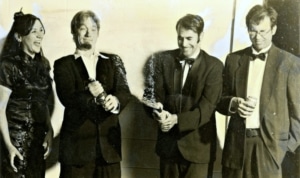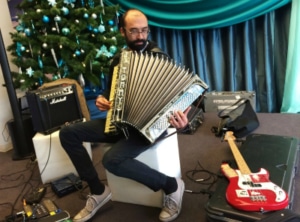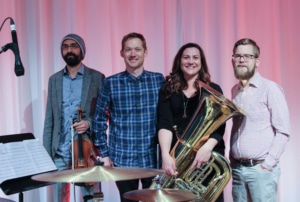DCPA NEWS CENTER
Enjoy the best stories and perspectives from the theatre world today.
Enjoy the best stories and perspectives from the theatre world today.
This article was published on March 13, 2015
It’s too soon to know just how Sweeney Todd will sound once Stephen Sondheim’s masterpiece gets put through the megaphone of revered local band DeVotchKa.

This photo of DeVotchKa was shot in 2002 to celebrate The Denver Post survey naming the group Denver’s best underground band. From left: Jeanie Schroder, Shawn King, Nick Urata and Tom Hagerman.
But frontman Nick Urata, who’s got a bit of the demon barber running through his own veins, knows how he hopes his fresh musical meat pie comes out of the oven a year from now.
“We kind of want to make it loud and proud,” Urata said this week. “And hopefully we will sneak some rock ’n roll elements in there if possible, too.”
The Denver Center for the Performing Arts has announced an unprecedented programming departure with the release of its 2015-16 season: Its homegrown Theatre Company will present a full staging of Sweeney Todd set to an adapted score by DeVotchka. The plan is for Jeanie Schroder, Shawn King and Tom Hagerman to be playing in the orchestra pit every night. And, if his schedule allows, Urata has every hope of joining them, and up four or five additional musicians.
DeVotchKa was Grammy-nominated for scoring the 2006 film Little Miss Sunshine. Urata has gone on to score several more, including Crazy Stupid Love, Ruby Sparks, Paddington and the current Will Smith behemoth Focus, which has grossed $125 million worldwide in its first three weeks of release.
But for two decades in Denver, DeVotchKa has been a band of musical misfits beloved for a strict adherence to their gypsy roots and most comfortably living on the fringe.
“I was just thinking about how many years we were on the outside looking in,” said Urata, whose band now regularly sells out Red Rocks (and is expected to again at its fifth annual concert with the Colorado Symphony Orchestra on July 23). “It’s such an honor to be thought of as part of the actual scene now.”

Composer Tom Hagerman of DeVotchKa performed on behalf of ‘Sweeney Todd’ at the Cherry Creek Mall in 2016. Photo by John Moore
Named after a line from Anthony Burgess’ A Clockwork Orange, DeVotchKa’s music comes with a signature sound and a flavor all its own. Urata’s Sicilian vocals are enveloped by bass, tuba, trumpet, accordion, violin and percussion. It all mixes together for a Latin and Slavic aural amalgam that is often described as “mariachi polka punk.”
“Sweeney Todd is such a guilty pleasure,” Urata said. “I can’t think of a more perfect platform for us, being that we like coming from a dark and twisted place, and this is the ultimate dark and twisted musical opera.”
The dark and twisted DeVotchKa sound starts with Urata’s haunting wails that sound as though he has just emerged from a nightmare in a cold sweat, blurting his most intimate confessions to the world. And perhaps those phantasms are traceable to a 9-year-old Urata growing up in Croton, N.Y.
“When I was a kid, they would show commercials on Channel 9 for the New York production of Sweeney Todd, like, four or five times a night, and it used to give me nightmares,” Urata said with a laugh. “I didn’t even really know what a Broadway show was back when I was seeing those weird commercials every night. But it was constantly playing on TV, so it always loomed as large and mysterious. And it stayed with me. So I eventually got the soundtrack, and I have seen many various productions of it since then.”
Urata sees his collaboration with the DCPA evolving in much the same way it has with the Colorado Symphony Orchestra and other chamber groups. He imagines complementing the core band sound with horns, violins … and a barrage of percussion.
“The brass is really important in this show,” said Urata. “Trombones played a big part in the original score, and that’s one of our favorite instruments to write for, so we plan to expand on the brass section. Hopefully we will have multiple exotic horns in that section.”
Whatever DeVotchka comes up with will be necessarily groundbreaking, but the DCPA is not the first theatre to experiment with Sondheim’s exalted score. Last year, the master gave his permission for the Landless Theatre Company in Washington D.C. to concoct a prog-metal version of the musical, a form that blends classical and jazz while using metal to highlight some of the darker elements of the show.

From left: Tom Hagerman, Shawn King, Jeanie Schroder and ‘Sweeney Todd’ conductor Erik Daniells in preparation for the upcoming staging of Sweeney Todd.’ Photo by John Moore.
“If I know anything about Sondheim, it’s that he is very open-minded,” said Urata, who counts Sondheim’s West Side Story as his favorite musical. “I think that’s why we all love him – because he has always been so experimental.”
Urata knows Sondheim’s Sweeney Todd is already considered by many to be a masterpiece. He does, too. That’s why he said DeVotchKa intends to honor the source material.
“It’s a lofty challenge,” he said. “There are some vocal acrobatics in this show that have to be approached with some reverence. That’s the vehicle the story travels on in this play. So we have to stay true to that and just kind of build around it with our rock ‘n roll gypsy sound.”
To that point, Urata had not yet given a thought to the fact that in order for this unique collaboration to happen in Denver, Sondheim himself had to sign off on it. But then Urata was asked about it.
“And now that you say that, in the back of my mind, all I am thinking is like, ‘Wow, Stephen Sondheim is going to listen to this.’ We just hope he doesn’t puke when he hears it. But if anything, that will definitely light a fire under our (butts) to make this good.”
The idea started with a conversation between DCPA Artistic Associate Emily Tarquin and DeVotchKa’s Hagerman, who will be providing original music for Off-Center @ The Jones’ upcoming bit of theatrical experimentation called Perception, opening April 10.
Urata can’t wait to sharpen his musical blade, especially if the effort induces the band’s fans to come to the Denver Center and see live theatre.
“That would be amazing,” he said. “People don’t realize that we have this world-class orchestra, and we have this world-class performing arts center right downtown. Hopefully we can bring some people who might not otherwise check it out.”
DeVotchKa is not a band known for making demands. But, Urata admits, they did have one. All four and members want to have their throats slit, eight times a week.
“Yeah … that’s true,” said Urata. “We really want to get into that chair, if possible.”
Go big or go home, right?
“Exactly.”
Here are more excerpts from our conversation with Nick Urata:
John Moore: You have made some interesting, crazy departures. And this might be the most interesting, crazy departure of all. How did it happen?
Nick Urata: When we heard what show we are talking about, we definitely wanted to be a part of it. We’ve just been dancing around the issue for the past couple of months trying to clear out our schedules, and so it only became a reality in the last couple of days. It’s all pretty fresh.
John Moore: When I watch many local bands playing live, I can see an untapped theatricality to their music that sometimes I don’t think they even realize. But there has been an inherent theatricality to DeVotchKa from the very beginning. How do you feel about fully crossing over into theatre with this project?
Nick Urata: I think we have always been walking the line between those two worlds. We cut our teeth backing up burlesque shows back in the day. One of our first big tours was this vaudevillian variety show, and we were the pit orchestra. We had to think on our feet, and we had to dabble in all these different genres and mood swings throughout the show. We were at a crossroads as a band at that point, and I think it pushed us in the direction we took. We wrote a ton of our songs during that period.
John Moore: So is that Nick we are seeing on the stage, or a character?
Nick Urata: I have always felt, especially with this band, that I do my best work when I am not myself. In any given song, you are trying to tell a story, so that means you are portraying a character.
John Moore: That’s what actors do on the stage, of course, but I don’t know too many frontmen in local bands who think that way. Well, Slim Cessna and Jay Munly come to mind as frontmen who are assuming a character when they get up to perform.
Nick Urata:
I have to. That’s how I am able to embody a song. My favorite part of being an artist is playing a part for people, so I don’t want to bring too much of myself into it. You want to be bigger than life and more interesting to people than just being some guy singing at a mic.
John Moore: So 9-year-old Nick may not have known what a Broadway musical was when he saw those commercials for Sweeney Todd. Did live theatre become a part of your life as you grew older?
Nick Urata: Luckily, I had older brothers and sisters who were in musicals, so I became deeply immersed in that world throughout my childhood. I have always been a fan of musicals. Maybe that’s my dirty secret …
John Moore:
… Or maybe that is something to be celebrated.
Nick Urata: Yeah.
John Moore: So what kind of theatre turns you on?
I love the classics: Rodgers and Hart, and Rodgers and Hammerstein. West Side Story is my favorite musical. I love amazing melodies and lyrics that stand alone, even away from the show. That’s the stuff that takes me back to a warm and fuzzy place.
John Moore:
Well, Sweeney Todd is not a warm and fuzzy place.
Nick Urata: Yeah, and that is what is so cool about it. I don’t know if we can pull off the bright and sunny thing with this show.
John Moore:
When you were growing up, did you ever perform in live theatre?
Nick Urata: Only in very amateur productions.
John Moore: Gotcha. I was just wondering if you harbored any deep desires to play Sweeney Todd yourself.
Nick Urata: We haven’t talked about it – but I’ve certainly thought about it. (Laughing). Is there still time to audition? I would give it a try.
John Moore:
I’ve heard you sing, but I’ve never heard you sing Sondheim. You realize he only writes music that only a very small fraction of superhuman beings are capable of singing well, right?
Nick Urata: Yeah, but Sweeney gets the best songs in the play, for sure.
John Moore: Speaking of … we know Tom and Jeanie and Shawn are planning to be in the pit and playing every performance, along with with added musicians. What about you?
Nick Urata: I am planning on it. We are just trying to work out the logistics of it right now.
John Moore:
So there is a possibility that all four of you will be playing every night?
Nick Urata: That’s what we’re hoping. We don’t want to say it is definite and then let everybody down if it turns out I can’t do it logistically. It is a long run, and there are some other obligations I have to keep. But we are going to write it with all four of our parts in mind and then take it from there.
John Moore: So imagine yourself a year from now. What do you want to bring to his show that people have never seen before?
Nick Urata: Mostly, I am hoping we will bring people to the theatre who have never seen the show before to check out some Sweeney Todd. Maybe some of those people who might otherwise be at the hi-dive.
